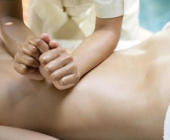Remedial Massage
Massage is a preventative and rehabilitative health care modality. It is preventative in that it addresses emerging pain patterns before they become chronic, and rehabilitative in that it can accelerate recovery from injury or surgical intervention. Massage is ideal for stress reduction, headaches, low back and shoulder pain, fatigue, and muscle strain as well as athletic related injuries such as knee, hamstring, and ankle strain.
What the Science Says About the Effectiveness of Massage
A lot of the scientific research on massage therapy is preliminary or conflicting, but much of the evidence points toward beneficial effects on pain and other symptoms associated with a number of different conditions. Much of the evidence suggests that these effects are short term and that people need to keep getting massages for the benefits to continue.
Researchers have studied the effects of massage for many conditions. Some that they have studied more extensively are the following:
Pain
- Systematic review and clinical trial concluded that massage can be useful for chronic low-back pain and neck pain.
- Massage may help with pain due to osteoarthritis of the knee.
- Studies suggest that for women in labor, massage provided some pain relief and increased their satisfaction with other forms of pain relief.
Metal Health
- Meta-analysis of clinical trials concluded that massage therapy can help to reduce depression.
- Brief, twice-weekly massage sessions for 12 weeks were associated with a decrease in depression, anxiety, and back and leg pain in pregnant women suffering from depression. Also, the women’s babies weighed more than babies born to women who didn’t receive the therapy.
- Massage may help older people relax.
- For generalized anxiety disorder, massage therapy was no better at reducing symptoms than providing a relaxing environment and deep breathing lessons.
Cancer
Numerous systematic reviews and clinical studies have suggested that at least for the short term, massage therapy for cancer patients may reduce pain, promote relaxation, and boost mood. However, the National Cancer Institute urges massage therapists to take specific precautions with cancer patients and avoid massaging:
- Open wounds, bruises, or areas with skin breakdown
- Directly over the tumor site
- Areas with a blood clot in a vein
- Sensitive areas following radiation therapy.
Headaches
Clinical trials on the effects of massage for headaches are preliminary and only somewhat promising.





